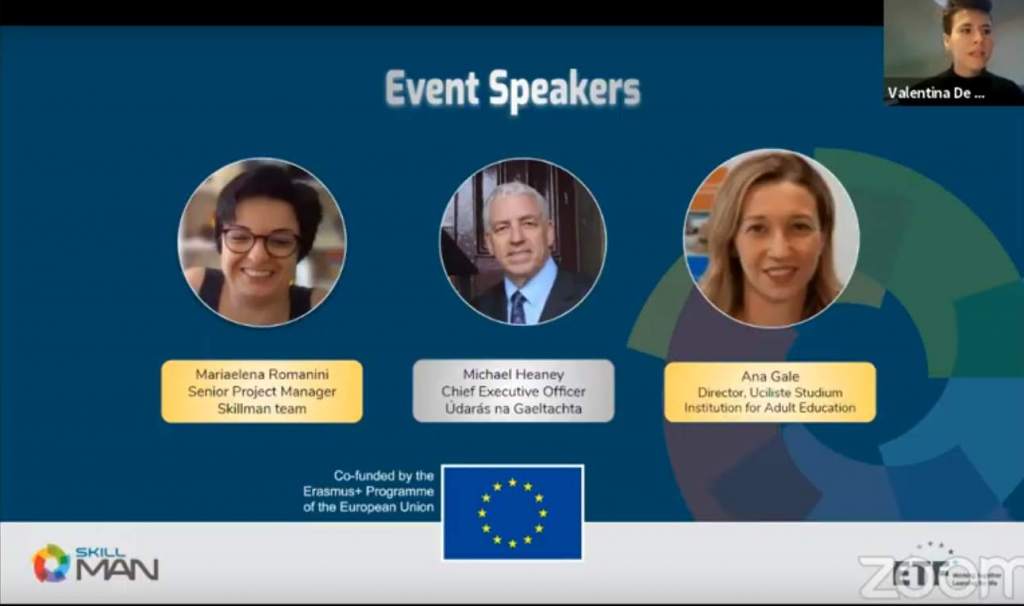 Share this!
Share this!On October 21st, the Assembly of European Regions in cooperation with Skillman Alliance, hosted the “Lifelong learning: Upskilling and Reskilling of 50+” webinar. This was the sixth webinar on EU funding opportunities that are being co-organized by AER within the Skillnet project framework (co-founded by the Erasmus+ Programme) in order to bring together experts in different fields linked to vocational education and training (VET) and establish relevant groups of collaboration for future EU project proposals.
The webinar presented examples of how regions address the need for reskilling and upskilling and provided insights on funding opportunities and EU programmes supporting life-long learning.
Rapidly changing labour markets
In the context of rapidly changing labour markets, the upskilling and reskilling of adults has become a priority. Technological changes and digitalisation require new skills, while many regions in Europe are faced with both an ageing population and labour and skills shortages.
Elena Romanini, Senior Project Manager at Skillman, emphasized that upskilling and reskilling of low skilled adults is one of the crucial challenges for policymakers and Education providers, underlined in the New European Skills Agenda. Ms Romanini shared recommendations for tackling mentioned issues: training teachers to deliver online courses, implementing micro-learning (holistic approach for skill-based learning and education which deals with relatively small learning units) and developing effective testing methods and certificates which will ensure that online training is valued in the labour market.
Regional experiences on upskilling and reskilling
The webinar highlighted two regional examples on upskilling and reskilling from AER member regions.
Michael Heaney, Chief Executive Officer at Údarás na Gaeltachta, provided participants with valuable insights into the programmes they are running as a developing agency.
- Apprenticeship Scheme which allows people from the Gaeltacht regions, who are fluent in the Irish language, to apply for two different types of apprenticeships: – Trade Apprenticeships (Carpentry, Electrical etc.) – New Age Apprenticeships (Lab Technicians, Software Analysts etc.)
- Graduate Development Scheme that allows a Gaeltacht graduate to gain experience with a Gaeltacht based company.
- Tourism Management Scheme which supports a range of strategic tourism projects in the Gaeltacht regions.
- Media Training & Skills Development scheme which aims is to support production companies to develop the skills and talent of their production staff.
Furthermore, people who are over 50 oftentimes are being discriminated against in terms of employment and there is a consistent association between ageing and reduced participation in learning. In this context, our third speaker, Ana Gale, Director of Uciliste Studium, highlighted the relevance of working on motivation as the key success factor for the enrolment in education programmes in the 50+ age group. It is for this reason, that Uciliste Studium always organizes motivational workshops before the beginning of any training. Ms. Gale also pointed out that upskilling and reskilling can be funded through European Social Fund, Interreg and Erasmus+ programmes.
The only important skill of the 21st century
Speakers agreed that the only skill that will be important in the 21st century is the skill of learning new skills! Sharing personal stories is instrumental in generating motivation for upskilling and reskilling: it is not just the professional perspectives that are improved but also personal relations!
Share your story!
A whole new set of webinars on EU funding opportunities is currently being prepared. Don’t hesitate to contact us if you would like to share your experience during a webinar or have questions you would like to see addressed in a webinar!
As a follow-up of each SKILLNET webinar, a Partnerships in Focus bulletin is published. Previous bulletins can be found below:
1) Partnerships in Focus n1: Capacity Building in Higher Education
2) Partnerships in Focus n2: Skills and Education Guarantee Pilot
3) Partnerships in Focus n3: Knowledge Alliance in the Maritime Sector
5) Partnerships in Focus 5n: Youth Policy Partnerships
EU Funding Opportunities:
- VET toolkit for tackling early leaving
- Selection results: Support for Festivals – Support to Festivals (Action 1) and Support to European Networks of Festivals (Action 2) – EACEA/26/2019 – deadline 21/05/2020 21 October 2020 Selection results: Support for Festivals – Support to Festivals (Action 1) and Support to European Networks of Festivals (Action 2) – EACEA/26/2019 – deadline 21/05/2020 have been published.
- Selection results – ERASMUS+: SPORT 2020 20 October 2020 Selection results for the call for proposals ERASMUS+ SPORT 2020 are now available.
- Teachers’ and School Heads’ Salaries and Allowances in Europe 2018/19 1 October 2020 Teachers’ and School Heads’ Salaries and Allowances in Europe 2018/19 This report covers the statutory salaries of teachers and school heads in pre-primary, primary and general secondary public schools in 2018/19 in the Erasmus+ countries.
- The Organisation of the Academic Year in Europe – 2020/21 25 September 2020 The Organisation of the Academic Year in Europe – 2020/21 This publication, based on national data, give accurate information on the beginning of the academic year, term times, holidays and examination periods. The information is available for 37 countries.
- Information about EACEA’s new generation of funding programmes 15 October 2020 EACEA’s funding programmes from 2014-2020 – such as Erasmus+, Creative Europe and Europe for Citizens – will soon come to an end and will be replaced with new programmes for the 2021-2027 period.
- Equity in school education in Europe: Structures, policies and student performance 14 October 2020 Equity in school education in Europe: Structures, policies and student performance
- Erasmus Days 2020 – Let’s celebrate the Erasmus+ programme! 14 October 2020 The 4th Edition of the #ErasmusDays is here! From 15 to 17 October, more than 4000 blended or virtual events will be held to celebrate the Erasmus+ programme in Europe and all over the world.
